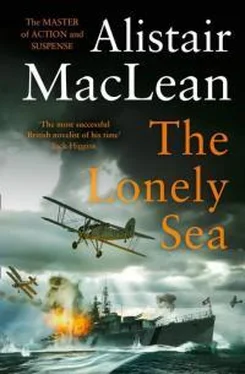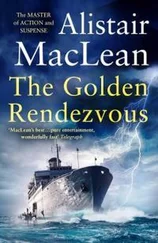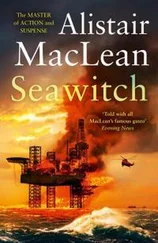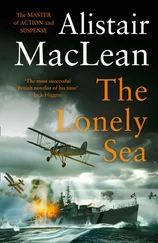1 ...6 7 8 10 11 12 ...48 All of the survivors are unanimous in their unstinted praise of the magnificently selfless work performed by the crew of that ship: operating from the St Laurent ’s boats while the destroyer itself kept constantly on the move to avoid submarines, they scoured the area for hours until they collapsed unconscious over their oars, having driven themselves far beyond the limits of exhaustion.
In all, the crew of the St Laurent picked up and took to safety over eight hundred survivors, an astonishing feat almost without parallel in the lifesaving annals of the sea, almost enough to make one forget, if even only for a moment, the barbed wire and the thousand men who died.
Almost, but not quite.
Even with the two brand new untried battle cruisers under his command, even although he was leading them on this, their first sortie against the enemy and the cold, dark hostility of the winter north Atlantic, Vice-Admiral Marschall was as unworried as any fleet commander can ever hope to be in wartime. Wilhelmshaven was dropping south behind him into the early gathering dusk of a November afternoon and the low flat shores of Jede Bay were already vanishing into nothingness, but Marschall never spared them a glance. He was busy, far too busy for any of this nonsense of sentimental farewells, and, besides, he knew he didn’t have to bother. Barring accidents, it would only be a matter of brief time before he saw these shores again.
And there would be no accidents. Of that the Squadron Commander, Marschall, was convinced. One of Germany’s best and most experienced naval officers, Vice-Admiral Marschall was fully aware that in wartime the element of risk could never be fully eliminated, that chance must always play its part. But the risk was negligible: not only was he the gambler who had been dealt all the best cards in the pack – he was playing against a blindfolded opponent.
Already, in these first few months of war, the German Naval Intelligence Service, with the intensive preparations of years behind them, was operating at maximum efficiency. Its agents were scattered all over Britain and the neutral countries of Western Europe – and these agents were the best there were. The accuracy and completeness of the information obtained was matched only by the speed with which this information was transmitted to Berlin.
German Naval HQ knew the position, speed, course and destination of almost every convoy leaving or approaching Britain. They knew the position of every British capital ship – and they knew that on that day, 21 November, 1939, every British capital ship was either in harbour or in far distant waters: that the Nelson and the Rodney were in the Clyde, the Hood and the French battlecruiser Dunkerque were in Plymouth, a cruiser squadron was fuelling and victualling in Rosyth, and that the only other ship they might have had to fear, the aircraft carrier Furious was in Nova Scotia with the battleship Repulse. They knew, too, that after the torpedoing of the Royal Oak in Scapa Flow by Leutnant-Kapitän Günther Prien’s U-boat, the British Navy had precipitately abandoned that far northern base, and retreated to the Clyde and Forth, maintaining only a small secret base in Loch Ewe, a northwesterly Scottish fjord. At least it was secret as far as the British public and most of the Royal Navy were concerned: the Germans knew all about it.
There was, of course, no guarantee that these ships would remain where they were. Again, the Germans were unworried. Their experts had completely broken the British naval codes at that time, with the results that British naval redisposition orders were known to the Germans almost as quickly as they were to the captains of the ships concerned.
Not that Marschall had any intention of engaging any large British ships in any case. His superior, Admiral Raeder, had been adamant on this point. This was only a shakedown cruise which might pay the added dividends of dislocating our shipping and drawing off our patrols.
There was the further possibility that news of the departure of the squadron might be transmitted to London by espionage agents, but, in view of past achievements of the British Intelligence Service, that was highly unlikely. At the time, our Intelligence Service was untrained, cumbersome, and almost wholly ineffectual – the Deutschland, for instance, after her first Atlantic foray, had been back in the Baltic for over a month before we knew anything about it. And, it must be confessed, our sketchy air patrols over the North Sea were, at the time, not much better than our Intelligence Service.
Vice-Admiral Marschall, therefore, felt justifiably light of heart as his two battle cruisers, the Scharnhorst and the Gneisenau cleared Jede Bay and sailed out into the cold, wind-swept darkness of the North Sea. A bitter night, a bad night, but Marschall welcomed it, for over and above all the cards he held in his hand, the darkness of the long northern winter nights, the forecasted bad weather and visibility reducing rain-squalls and fog were further powerful allies, that made for safety. Marschall reckoned that it would take him exactly forty-eight hours to reach the Iceland-Orkney line of the British contraband control.
The British Northern Patrols were in position, thinly stretched out over nearly a thousand miles of sea. Cruisers were the backbone of this patrol, but mostly superannuated ships of the old C and D classes. Only four ships could be reckoned as really effective fighting units: the Norfolk and the Suffolk, the same two ships as were to report the historic breakthrough of the Bismarck into the Atlantic in May 1941, were in exactly the same position as they were on that memorable day – the Denmark Strait – the Glasgow was just to the north-east of the Shetlands, with the Newcastle stiffening the line between the Faroes and Iceland. Of these, only the Newcastle was anywhere near the coming scene of action, but even she was too far away.
Holding much of the line in between these cruisers were the armed merchant ships. For contraband control – the stopping and searching of ships carrying proscribed cargoes – these ships were ideal in the high wild latitudes of the Atlantic. Big ex-passenger ships, able to remain at sea for long periods in bad weather, they were stripped of all their luxury fittings, and fitted with guns sufficient to deal with any cargo ship. But only with cargo ships – they were never intended to cope with anything else: it is significant that the very first move of the Admiralty when they finally learnt of the breakthrough of the Scharnhorst and Gneisenau, was to withdraw all the armed merchant ships off the northern patrol. But the order came too late, tragically but inevitably, for one of these ships; for it was not until the Scharnhorst and Gneisenau turned their great guns on the Rawalpindi that the Admiralty knew that these two ships, then the most powerful in the German Navy, were loose in the Atlantic.
The 17,000-ton Rawalpindi, in peacetime a crack P & O liner plying between Britain and the Far East, was one of the first Merchant Navy vessels to be converted to an armed merchant ship. Her gay pre-war colours were gone, lost under a drab coat of battleship grey. The lavishly furnished interior had been gutted, a main control gunnery room constructed and deck fittings removed to make way for ammunition lockers and her hastily installed armament – eight old 6-inch guns, four ranged along either side. But there had been no time, no opportunity to make any alteration to her unarmoured sides and decks, and the strengthening of these was largely impossible anyway: in terms of the penetrating power of modern armour-piercing shells, the hull of the Rawalpindi might as well have been made of paper.
Читать дальше
Конец ознакомительного отрывка
Купить книгу












